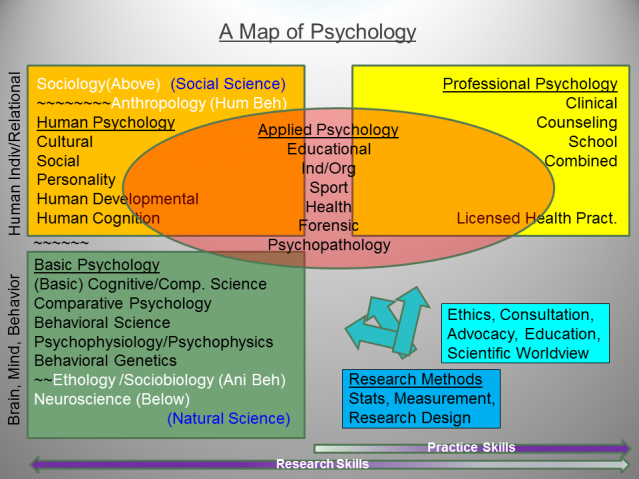Identity
Getting Clear About the Problem of Psychology
Much work needs to be done developing a better map of the field.
Posted May 2, 2014
As suggested by the topics listed on the Psychology Today home page, when most people think of the field of psychology they think of things like personality, relationships, sex, cognition, happiness, depression, anxiety, and psychotherapy. Although these categories serve the useful function of educating a general audience about things they care deeply about, they mask the problem of fragmentation that lurks beneath the surface. It is important for everyone who cares about the field to be aware that there is an enormous amount of conceptual confusion, ambiguity, and dispute about the “true identity” of psychology (i.e., there is no consensually agreed upon way to think about what the term "psychology" means).
In fact, students of the field are often a bit discouraged to learn that there really is no clear conception of the field that goes by the label “psychology.” In contrast to, say, biology, which is relatively well defined as the science of life, scholars, educators, and practitioners of psychology do not really share an agreed upon definition or identity. Instead, the field is (at least currently), best described as “a collection of studies” (a phrase used by the famed scholar of psychology, Sigmund Koch). Rather than a clear conception of the field, it is more the case that psychologists attempt to develop understandings and competencies on topics that might be vaguely characterized as existing “above” biology on the one hand and “beneath” sociology on the other (at least in terms of size, scope and complexity). The vagueness and ambiguity about the field’s identity and subject matter is so bad I have referred to is as “The Problem of Psychology.” (More crassly, I have been known to proclaim: "No one knows what the f@!k psychology is!").
Below I review the major elements that contribute to the problem of psychology. But prior to doing so let me give you a map of the field that might help you make sense out of it. What I have done here is arrange a visual of the field of psychology into three key branches (see here for a blog on these branches), and the shared methodological knowledge base and commitments (the two blue boxes in the lower right). My hope for those new to the field is to use this map to locate the area of psychology that they are most interested in. For those more familiar with the field, I believe this map can help to begin to etch out a solution to the problem of psychology, because when you see it mapped this way, at least some of the problems I describe below seem more solvable.

Looking at the map, the first dimension to notice is the left-to-right dimension—this represents the basic research to applied research to practice dimension. On the left side, the more academic and research domains of the field are represented, whereas as you move to the right there is a move through the more applied domains ultimately, in the yellow box, to the “practice areas” that lead to licensure and identity as a health service provider in the field. Now it is important to note that within the areas there is a research-practice dimension, such that an individual in clinical psychology might focus primarily on professional practice or conducting research or both. This is represented by the skill lines on the bottom. Although this is true, I argue strongly that the primary identity of the yellow box is that of a health service provider, not a behavioral science methodologist.
Returning to the left side of the map, there are the domains of psychology that have identities as academic and research domains. You will notice there are two boxes. The green box consists of those disciplines of psychology that are interested in brain-mind-behavior relations broadly defined, and researchers in these areas often study animals and neurophysiology in the lab. The orange box is separate because it contains the disciplines in psychology that focus on human behavior at the individual level. Finally, there are a number of (human) psychological disciplines that exist between the primary practice areas (and their identities as health service professionals) and the more primarily research areas on the left. I refer to these as the “applied” disciplines and they occupy the middle red circle (e.g., sport, health, I/O psych). If you are curious to see how this map fits the field, you might check out the various divisions in the APA, which are listed here. I think you will find significant overlap with the map, although there are many divisions, such as military psychology (19), the psychology of media and technology (46), and LGBT issues (19) that are too specific to be listed in this kind of map. (For an interesting history of the divisions, see Dewsberry, Unification Through Division).
The Reasons for the Problem of Psychology
With this map in place, let us now return to reviewing the factors that contribute to the problem of psychology. There have been a multitude of reasons that psychology exists currently as a collection of studies as opposed to a more coherently defined discipline. My hope, though, is that with the above map in mind, you might be able to get a better sense as to how a solution to these problems might be framed.

The Problem of Subject Matter
The first general problem of the field has to do with the subject matter of psychology. What is our primary object of study? Is it the general study of mind-brain-behavior relations or is it “really” the study of human individuals? Historically the field has answered this question in different ways. Initially, the field was about human consciousness. Then, during the behaviorist reign in America from the 1920s through the 1960s, animal behavior (of which human behavior is a subset) was the proper subject matter of psychology. With the assent of cognitive and humanistic approaches (and psychotherapy) over the past 50 years or so, the focus shifted back to be primarily at the level of the human individual (although many modern psychologists do study animals—"animal behavior" is a topic on PT and several APA divisions focus essentially on animal behavior). Many (like behaviorists) still use “psychology” to mean animal behavior in general. Whereas others—evolutionary psychologists for example—seem to think the term only appropriately applies to humans. This is a major semantic and conceptual issue for the field to sort out. (Here is a blog on how I define psychology).
The Mind/Body/Brain/Consciousness/Behavior Problem
Related to the basic issue of subject matter has to do with how people think about the nature of the subject matter. When you think of psychology, are you thinking of behavior (both overt and covert)? Or are you thinking of cognition or consciousness that is causing behavior? The first position is called ‘behaviorism’ and the second position is called ‘mentalism.’ American psychology was largely behavioral and then became much more mentalistic with the rise of cognitive science, psychotherapy, and humanism. Nevertheless, there remains much confusion and dispute about how to clarify the relations between mind, brain, cognition, self, consciousness, and behavior. (Here is a blog on my definition of mind).
The Tower of Babel Problem
The Tower of Babel is a reference to the story in the Bible where people build a grand city and develop one language. Through history, the tower of babel in academic discourse has come to reference the confusion that ensues when people have different means for different words. Consistent with the first two points is the fact that the terms most foundational to our discipline, terms like mind, self, consciousness, behavior—the list goes on and on—are hard to define and people mean very different things when they use them.
The Problem of Worldview
Although most psychologists adopt a naturalistic worldview when approaching their field, a small but significant number of psychologists argue that this is an unwarranted, close-minded, assumption that is not driven by the necessity of logic but by preference. Some psychologists explicitly argue for a “theistic psychology.” In a separate but also related vein, other psychologists argue that there is empirical evidence for parapsychological phenomena, which, if true, would result in such a radical transformation of our understanding of cause and effect and mind and matter that naturalism as it is generally understood would need to be fundamentally revised. (Here is a blog on the three major worldviews that relate to this issue).
Problems in the Philosophy of Science and Conflicts between Scientific and Humanistic Visions
In a 1984 article titled "Psychology’s Two Cultures," Gregory Kimble empirically documented that established psychologists could be divided along two broad philosophical commitments, which he labeled science and humanism. The “scientists” saw psychology generally as a natural science discipline and they valued things such as accuracy, precision, measurement, quantification, reliability, critical thought, and skepticism. In contrast, the humanists tended to see psychological knowledge as a social science or even connected to the humanities, and they valued meaning, relationships, subjectivity, and the unique and idiographic nature of the human experience. Here is a blog on the "science wars" and the need for a scientific humanistic philosophy writ large.
The Problem of Identity
Another domain of contention has been whether psychology’s core is fundamentally that of a research discipline or a health service profession or is simultaneously both. Of all the various conflicts between paradigms and philosophies, the conflicts between psychological researchers and professional practitioners have been the most salient, the most politically charged, and have had the most impact on the institution of psychology. Unlike other disciplines, which explicitly separate the science from the professional application of scientific knowledge (e.g., physics and engineering; biology and medicine; sociology and social work), the same term “psychology” refers to both the science and the professional practice of the discipline. See here for a blog on the battle for the identity of professional psychology.
Disconnected Domains of Causality
Given the above discussion, it should come as no surprise that psychologists have struggled to develop effective, comprehensive models of psychological phenomena. Consider the following questions. Is animal behavior a function of brain, cognition, or environmental contingencies? Are the key determinants of human action personality traits or situational variables? Is intelligence more a function of genetic or environmental influence? Is depression a normal human reaction, a psychological disorder, or a biological disease? I should note that the problem is not that there is debate about these things. That is fine and understandable. The problem is that we don’t have even the outline of a generally agreed upon conceptual framework that aligns the major domains of cause in a coherent way. See here for a blog on this issue rearing its head in recent debates about the nature of human sexuality and gender differences.
Problems of Proliferation
As I note in this blog, psychology is deeply embedded in what Knudsen calls “the fragmentation trap.” This occurs when new theories and research paradigms are introduced without replacing older theories, such that there is a massive proliferation of ideas. It also occurs when the field over-values novelty and uniqueness and the focus of researchers is largely in generating new data, methods, and ideas, as opposed to testing and building on existing foundational ones. This tendency is widespread in psychology, and thus what we see is a mentality of “fad and fashion” as opposed to the accumulation of knowledge.
My hope is that this blog both increases awareness about why there is such confusion and, simultaneously, how we might begin to develop maps that enables everyone to see a pathway forward to a more coherent—and thus much more potent—discipline.




